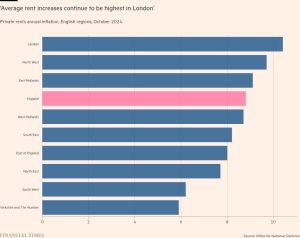Lobbying for unfettered innovation is bad for democracy
Unlock the Editor’s Digest for free
Roula Khalaf, Editor of the FT, selects her favourite stories in this weekly newsletter.
The writer is a fellow at Stanford University’s Institute for Human Centered Artificial Intelligence and the Cyber Policy Center. She is the author of ‘The Tech Coup’
Whenever a regulatory proposal that has an impact on technology companies pops up, it is only a matter of time before the mantra “regulation stifles innovation” follows. So often has this phrase been used that it has become something of a truism, with legislators that are simply doing their jobs now defending themselves pre-emptively as not wanting to stifle innovation. It is time to call the bluff on this catchphrase.
This year has been dubbed “the year of democracy”, given the unprecedented number of elections happening around the world — involving nearly half the global population. It could also be called the “year of lobbying”, as interest groups including tech companies, see a crop of newly elected leaders such as in the EU and the US to establish relationships with. Tech companies have been spending ever more dollars on “public affairs” — or the advancement of their private interest.
Recently, regarding artificial intelligence, warnings that regulation will choke off innovation have been thrown around once more. The EU’s AI Act, for example, due to come into force next year, has been accused of showing a bias towards knee-jerk regulation.
But let’s pause for a moment and challenge the premise of this charge. First of all, regulatory efforts vary and the regulatory process can lead to an endless number of outcomes. Where rules to ensure more competition may foster innovation, those that cut budgets on higher education will hurt it. Smoothing access to capital helps and overly bureaucratic processes hinder.
Certainly, regulations have led to plenty of innovations. Think about the spur that laws to prevent CO₂ emissions have given to the development of more energy-efficient cars, home appliances and buildings in countries around the world. Even tech companies themselves continue to benefit from the rules that guarantee limited liability for content shared on social media platforms through the US’s Communications Decency Act section 230.
But the notion that regulation should not be imposed if it would stifle innovation is also misguided. It implies that innovation is the most important objective, while economic advantage is only one of many important goals. In fact, democratic governments are confronted with trade-offs between protecting fundamental rights, fair competition and national security. That may mean that innovation cannot always continue unrestricted. Certainly, companies do not have the “right to innovate”, even if they do try to persuade another generation of politicians that regulation is an unjust violation of their rights.
For a moment, let’s consider the opposite: what if innovation stifles the regulatory process and democracy? Disinformation is already eroding trust in the US electoral process, even if there are no facts to back up claims made about wrongdoing such as manipulation of the outcomes. And the ever-changing nature of AI, highly personalised and developing through machines that learn, makes the oversight process as we know it unfit for purpose.
For decades, the biggest tech companies have enjoyed the hands-off approach of US regulators, and until recently, EU lawmakers, too. Silicon Valley executives have apparently become so comfortable that they want to make us believe any restrictions imposed on them will throw away the baby with the bathwater. In other words, that all the good the internet has brought, billions of people will vanish when laws to strengthen democratic values in the digital world are passed.
Political leaders should not fall for the spin. Instead of succumbing to the lobbying, democratic lawmakers’ mandate means they have the duty to advance the kind of tech regulation that puts democracy first and strengthens the rule of law.
Silicon Valley has convinced people innovation is so essential that it must be prioritised above all else. Heaven forbid that a rule to protect fair competition, non-discrimination, access to information or democracy itself should be allowed to kill innovation.
This mindset suggests that economic interests are always the top priority. It is time to revisit that notion, especially as democracy is under historic pressure not least because of unregulated technology. “Regulation stifles innovation” is the most successful lobbying presentation ever introduced. Newly elected and appointed leaders around the world should not fall for it. We cannot allow disruptive technologies to innovate away democracy.
#Lobbying #unfettered #innovation #bad #democracy







